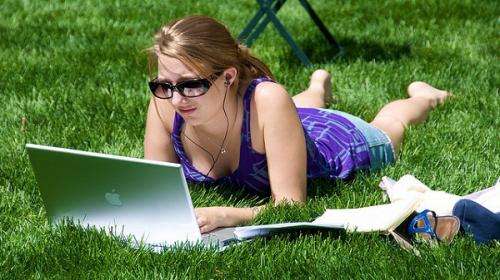More sunlight exposure reduces risk of shortsightedness

The more time adolescents and young adults spend outdoors exposed to sunlight, the lower their risk of being shortsighted (myopic) is, eye experts have found.
Researchers used conjunctival ultraviolet autofluorescence (a measure of sun damage to the eye), to measure how much light gets onto the eye to investigate the association between myopia and outdoor activity.
The study comprising 1344 young adults from WA's Raine Cohort Study used a new camera system developed by UNSW's Professor Minas Coroneo to take ultraviolet photographs of the participants' eyes.
These photographs were then used to assess the sun damage to the surface of the eye.
Lions Eye Institute Managing Director David Mackey says conjunctival ultraviolet autofluorescence (CUVAF) is a more objective and accurate method of measuring sun exposure than questionnaires, which have been used in other studies.
"There might be bias in a research study if the participants played down the amount of time they spend outdoors," he says.
Professor Mackey says 20 per cent of the WA population is myopic, while over 90 per cent of the young adult populations in Asian countries, such as Singapore, are myopic.
"Having a large number of people who are shortsighted increases the risk of blindness from other diseases such as glaucoma, macular degeneration and retinal detachment," he says.
Prof Mackey says while it is not fully understood how outdoor activity prevents myopia, there are various theories to explain the association.
"One theory is that the direct effect of the UV light on the front of the eye changes the structure of the wall of the eye."
"Another theory is that exposure to sunlight results in the retina releasing the chemical dopamine, which stops the eyeball from growing excessively and blocking the focus of light entering the eye," he says.
While the CUVAF photographs showed evidence of sun damage in the eyes of those participants who had higher exposure to sunlight, it also found that more exposure to sunlight decreased the odds of myopia.
However, Prof Mackey says encouraging people to spend a lot more time outdoors could also increase the risk of skin cancer and can lead to eye diseases such as pterygium—a growth in the conjunctiva of the eye.
"Thus, part of the aim of our ongoing research is to come up with a balance and work out what is the right amount of outdoor activity people can have," he says.

















